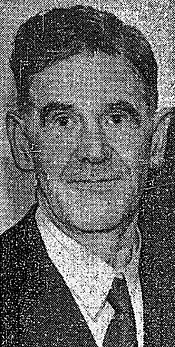James Everett
James Everett (1 May 1894 – 18 December 1967) was an Irish Labour Party politician who served as Minister for Justice from 1954 to 1957, Minister for Posts and Telegraphs from 1948 to 1951 and Leader of the National Labour Party from 1944 to 1950. He served as a Teachta Dála (TD) for the Wicklow constituency from 1923 to 1967.[1]
James Everett | |
|---|---|
 | |
| Minister for Justice | |
| In office 2 June 1954 – 20 March 1957 | |
| Taoiseach | John A. Costello |
| Preceded by | Gerald Boland |
| Succeeded by | Oscar Traynor |
| Minister for Posts and Telegraphs | |
| In office 18 February 1948 – 13 June 1951 | |
| Taoiseach | John A. Costello |
| Preceded by | Patrick Little |
| Succeeded by | Erskine H. Childers |
| Leader of the National Labour Party | |
| In office 23 March 1944 – 19 August 1950 | |
| Preceded by | New postilion |
| Succeeded by | Position abolished |
| Father of the Dáil | |
| In office 23 June 1959 – 18 December 1967 | |
| Preceded by | Éamon de Valera |
| Succeeded by | Liam Cosgrave |
| Teachta Dála | |
| In office August 1923 – 18 December 1967 | |
| Constituency | Wicklow |
| Personal details | |
| Born | 1 May 1894 Cork, Ireland |
| Died | 18 December 1967 (aged 73) Bray, County Wicklow, Ireland |
| Nationality | Irish |
| Political party | Labour Party |
| Other political affiliations | National Labour Party (1944–1950) |
He was leader of the short-lived National Labour Party, which briefly split away from the Labour Party over a dispute relating to support for James Larkin as a candidate in Dublin.
Career
On leaving school Everett became an organiser with County Wicklow Agricultural Union, which later merged with the ITGWU. He was a member of Sinn Féin and served as a justice in the Republican courts for Kildare and Wicklow from 1919. He was first elected to Dáil Éireann in 1923 as a Labour Party TD for Wicklow.[2] Everett was one of the six TDs who left the Labour Party in 1944, because of its alleged infiltration by communists, and formed the National Labour Party. Everett became the leader of the new party.
In 1948, the National Labour Party joined the Cabinet of John A. Costello in the First Inter-Party Government and Everett was appointed Minister for Posts and Telegraphs. In 1950, Everett, as Minister for Posts and Telegraphs became involved in a bizarre incident known as the "Battle of Baltinglass." Everett appointed Michael Farrell as sub-postmaster in the local post office. The office had been run by Helen Cooke for her invalid aunt, whose family had held the position since 1870. Local feeling ran high in support of Cooke, with telegraph poles being cut to prove their point. Allegations of political jobbery were denied but Everett's actions became a national issue. Farrell resigned in December 1950 and Everett bowed to the pressure and appointed Cooke. It is believed that the Baltinglass affair contributed to the downfall of the Inter-Party government in 1951.[3]
Also in 1950, during the First Inter-Party Government's tenure, the Labour Party and the National Labour Party reunited. Everett served in government again between 1954 and 1957 as Minister for Justice and in that capacity he granted Albert Luykx Irish citizenship. Everett died aged 78, during the 1967 Dáil Christmas Recess, when with 44 years service as a TD, he was joint Father of the Dáil with Frank Aiken and Paddy Smith.
References
- "James Everett". Oireachtas Members Database. Retrieved 2 January 2011.
- "James Everett". ElectionsIreland.org. Retrieved 2 January 2011.
- A Dictionary of Irish History, D.J.Hickey & J.E.Doherty, Gill and Macmillan, Dublin, 1980. Pp. page 25. ISBN 0-7171-1567-4
External links
- . . Dublin: Alexander Thom and Son Ltd. 1923. p. – via Wikisource.
| Political offices | ||
|---|---|---|
| New political party | Leader of the National Labour Party 1944–1950 |
Succeeded by Party disbanded |
| Preceded by Patrick Little |
Minister for Posts and Telegraphs 1948–1951 |
Succeeded by Erskine H. Childers |
| Preceded by Gerald Boland |
Minister for Justice 1954–1957 |
Succeeded by Oscar Traynor |